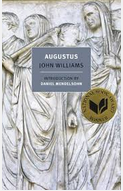Gaius Octavius Caesar Augustus, heir of Julius and the first Roman emperor, is the fascinating center of John Williams’ novel “Augustus,” winner of the 1973 National Book Award and available in an NYRB paperback edition, with an introduction by Daniel Mendelsohn. The book is an epistolary novel, a form that wasn’t invented for a millennium and a half after the lives of Augustus, his family, friends, fellow soldiers, and many enemies. Yet Williams renders his characters so fully that the reader believes their versions of events and the stories they have to tell.
Even emperors must be adept at politics, and Augustus was better than most. He outmaneuvered the wily Marc Antony before eventually defeating him at Actium. He made himself into Caesar’s heir and then expanded both the role – into Emperor – and the empire. The novel explores the politics, the factions, and the betrayals from the point of view of the various protagonists; it includes letters from Cicero, Livy, Cleopatra, the journals of Augustus’ daughter Julia, and the memoirs of various participants, including Agrippa. Williams starts with the known history, then arranges voyages, parties, and some events in order to shape his story. (Williams explains in a note that “With a few exceptions, the documents that constitute this novel are of my own invention . . . if there are truths in this work, they are the truths of fiction rather than of history.”)
Augustus’ story is a compelling one. He was a great-nephew of Julius Caesar, who adopted the boy, then known as Octavius, shortly before Caesar’s murder in the Roman Senate. The first letter, from Julius Caesar to Atia, Octavius’ mother, sets the stage, placing Octavius and three friends in Greece, where they are studying and training with a Roman Legion, at the time of the murder. The three friends, Marcus Agrippa, Gaius Cilnius Maecenas, and Silvidienus Rufus became Augustus’ advisors and his generals. When it was convenient, Marcus Agrippa was, for a while, Augustus’ son-in-law. It was a happy marriage that lasted until Agrippa’s death. But Augustus later forced his daughter Julia to marry again, in order to secure Tiberius’ succession.
The personal costs of Augustus’ ambition are evident on nearly every page. He must cut himself off from love and from true partnership, and settle for companions. For the most part, his companions, particularly those from his youth, proved loyal. When one of them – Silvidienus – mis-times the turning of his coat and is caught offering loyalty to Marc Antony, Augustus is ruthless. Augustus’ single-mindedness allows him to disregard even the emotions of his daughter Julia. Williams’ Augustus loves his daughter as much as he loves anyone. This love doesn’t stop him from using her.
Julia watches her father at the public rituals surrounding Agrippa’s funeral, and we see his pain and his stoniness through her eyes: Augustus, she says, “spoke before the body of Marcus Agrippa as if it were a monument, rather than what remained of a friend.” She also recognises his pain. Julia understands why he forces a third marriage, to Tiberius, on her, but the marriage is too much for her. What happens between Julia and Augusts takes up much of the final third of the book, and is as compelling as the military and political exploits of the earlier half.
It’s an extraordinary book that should have a much wider readership. Let us know your thoughts about what if anything our politicians can learn from Augustus in the comments.
Have a book you want me to know about? Email me at asbowie@gmail.com. I also blog about metrics at asbowie.blogspot.com.



